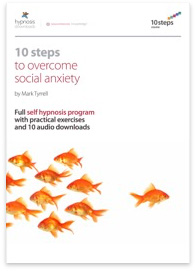How to Get Along with People
Making friends can seem like something that 'just happens', but there are fundamental principles you can learn
 "We are like islands in the sea, separate on the surface but connected in the deep." William James
"We are like islands in the sea, separate on the surface but connected in the deep." William JamesSome people have a secret knack. They have a way of winning over the grumpiest of curmudgeons. They read the mood of others and enter the dance of sociability at just the right point, never leading or following too much. They have plenty of friends - real ones, not just a list on social media. People just naturally like and respect them.
Maybe you know what that's like. That sense of being in harmony and relaxed with others, like you've known them all your life. And if you don't know that feeling, then I aim to get you there more often with this piece.
One thing's for sure. We need other people, and other people need us.
How social connection powers your life
For millions of us, our 'social life' now consists in bowing our heads down while peering into the soulless electronic gleam of a smartphone.
It seems many younger people brought up on social media are losing the art of actual face-to-face interaction.1
In fact, those born between 1995 and 2012 are less likely to hang out with friends face to face, less likely to date, and more likely to feel lonely even when connected online.2 I don't think it's too much of a leap to suggest they may be less skilled at face-to-face interaction, which may be a major reason why they are the most depressed generation ever.3
Real, genuine social connection makes us happier and healthier. On the other hand, not getting along with people and feeling isolated makes us miserable and sick.4,5
Knowing how to get on with people and having a wide circle of real, not just digital, friends also helps us become successful. It seems knowing lots of people confers more opportunities.6
So the better our (actual) social lives, the better we feel in all kinds of ways, and the more opportunities we have too.
To get along with others effectively, we need to know how to remain onside with them - or at least not turn them off needlessly!
How to not repel other people
"If we treat people without consideration for their feelings and do not know it, we shall always be suffering from their wish to keep away from us."
- Maurice Nicoll
It's clear that some people are more offensive than others. They seem to habitually 'wind people up the wrong way' and perhaps don't even know why. Sure, there are always natural clashes of personality, and that's fine and natural. But some of us seem to have a problem connecting with other people generally. And many of us could do with some help fine tuning social skills.
People have problems getting along with others for three possible reasons:
- They know they are upsetting people but just don't care.
- They don't know they are upsetting people and are confused when others avoid them.
- They are aware that they turn other people off but don't quite understand why.
If you really don't care how you affect or connect with others, fair enough. You can stop reading now. But if you feel you'd like to relax more around other people and generally give and gain more from your social life, I hope this will be useful.
So what do people need from us in order to start feelingconnected?
What we all need
Everyone, everywhere, has basic emotional primal needs. To understand other people and yourself you need to be aware of and consider these needs. We feel unhappy when we don't meet them or fear we might not. Conversely, when they are met we feel secure and happy and have the spare capacity to focus on long-term goals.
Our emotional needs include:
- the need to feel safe and secure
- the need to give and receive attention
- the need for a sense of status
- the need for purpose and goals
- the need for physical wellbeing
- the need for connection to something greater than ourselves - community, ideals, and shared beliefs
- the need for intimacy, a sense that you are accepted for yourself and can be natural and loved without having to present a certain way
- the need to be stimulated and stretched (but not stressed) so to as avoid boredom and make life feel meaningful
- the need for a sense of control.
People like us when we help (or seem to help)them meet one or more of these needs, even if it's only to a small extent, and don'tdiminish their sense of completing any of these needs.
When you understand the needs of other people, they will really start to like and need you.
Understanding the formula of friendship
When making friends, understanding how emotional needs work is essential. It's unlikely we will meet all the needs of our friends and acquaintances, but meeting some of them effectively will make us feel valuable to them.
You might have noticed that different friends meet different needs in your life. For example:
- You may make a friend who is fun and exciting but who you wouldn't necessarily tell your deepest secrets. Fun and laughter can both meet the need for creative stimulation, while excitement can help meet the need for challenge.
- Another friend may be less exciting but a wonderful listener, and give wise counsel. They may be someone you can share intimacies with, who makes you feel safe and secure because they are so dependable.
- Yet another may be a business partner, someone you can share aspirations and achievements with, meeting your needs for goals, status, and meaning.
- And that one person who meets all or many of your needs? And you seem to meet many of theirs? Hey presto, it's your perfect friend or partner!
So to be likeable and form true connections, we need to be a good friend. And of course, this is not about what emotional needs we have met by others but what needs we meet in them.
What makes a good friend?
People will tend to want to make friends with you if they feel you meet some of their emotional needs. If you make them laugh, you're giving them stimulation. If you look out for them, you're making them feel safe and secure. If you encourage them and point out their strengths, you're giving them a sense of control and status. If you ask their advice or share intimacies, you're making them feel trusted and more intimate with you.
Think about what you offer people and what others offer you. Basic emotional needs will always play a part.
Of course, we can't concern ourselves entirely with whether we upset people or meet their emotional needs, or whether they like us or not. If we focus on this too much, too consciously, we may start seeming needy or overly concerned with something that should come a bit more naturally.
But certainly, when getting to know people and building connections, we can think about their needs as well as our own. And we can regularly remind yourself of what the universal basic emotional primal needs actually are.
We don't have to complete all of a person's emotional needs of course, but we can be aware of avoiding needlessly not meeting them. If the person working in your local store ignores you, that is very different from if they smile and ask, "How are you?" They are not meeting any need in a profound way, but it all counts towards your sense of, on some level, completing your emotional needs.
So what can we do, more specifically, to connect with others and strengthen our bonds with them?
How to light that magic spark
We can't completely control how other people think or feelabout us, but we can influence it.
Lack of self-awareness or extreme social anxiety can make it uncomfortable to be around us and give the impression that we are unfriendly, standoffish, even stuck-up or aggressive. So learning to manage our emotions may be a key step in helping us meet both our own social needs and also the social needs of others.
People like confident people and tend to be drawn to them. Smiling more has the effect of making other people feel we are not only more intelligent, but also more approachable.7 This doesn't mean you should necessarily give a fake smile even when you don't feel it, but having some awareness of what your expression may be communicating can do wonders - and the more you smile, the more you feel like smiling.
Don't get me wrong - some people are simply hard to please or looking to be offended, and one part of being socially successful is not caring too much what other people think past a certain point. I've already said that confidence is attractive, and being able to shrug off other people's opinions from time to time is a part of that. But we can be confident and considerate of other people's needs.
A healthy exchange of attention is just that: an exchange. To be listened to, truly listened to, can feel amazing for people, especially in our hectic, clamouring, busy world.
But there is an art to making people feel uniquely listened to.
People like you when you listen well
When was the last time you felt truly listened to? Or, to look at it from the opposite perspective: What does it feel like to be with someone who makes you feel as though you are just an ear, and not even a unique ear? You could be anyone as long as you are listening to them. They are stuck on transmit, but their receive button seems to be nowhere in sight.
We can let people truly know we are listening by:
- actually listening to them, nodding, smiling, and looking in their general direction, and
- feeding back what they say to show them you know they actually said it, then adding anything of your own. If you don't agree, at least acknowledge they've spoken: "I understand what you mean, but as far as I see it..." or "That's a good idea... and it might be even better if..."
I play tennis with a guy every weekend. I make a point of listening to what he tells me and will sometimes make a point of asking about something he said on a previous weekend (sometimes many weekends before). And he will do the same with me. It feels like a good and fair exchange of attention and is a world away from the feeling that someone has no interest in you or no idea what is going on in your world.
By referring back to what someone has told you before, you are communicating the message that:
- they are important enough for you to actually take an interest in and listen to them, and
- they are important enough for you to remember and think about what they've told you.
Doing this even occasionally can do wonders for any type of relationship. Other ways to strengthen connections include:
- Asking opinions or for advice or help. People feel important if you ask them what they think. This meets their need for status.
- Talk to them about their concerns and interests. People will feel that you are interesting if you show interest in them. Don't compromise your own personality, but be aware of this basic rapport-building rule.
- Offer help and do favors. Research shows that people like people who are helpful, but also that people like people whom they are helpful for (this is known as the Ben Franklin effect). So someone may like you more if you give them a chance to help you (without being constantly demanding, of course). Giving practical help meets all kinds of emotional needs (you should, by now, be able to work out which ones!).
Finally - smile, smile, smile!
Other research shows that smiling at someone stimulates pleasure centres in their brain.8 People like this kind of warmth and will come to associate you with feeling good. Smiling relaxes people and make them feel they can trust you.
Some basic rules on smiling include:
- Don't overdo it!
- Don't smile when you are anxious, angry, or giving negative feedback - it's confusing!
- Don't smile when someone else has stubbed their toe. You smiling when someone else is having a bad time gives the message that you are glad it's not you, rather than that you wish it wasn't them!
Ultimately, while we can extend the olive branch of friendship, we can't make people take it. But we can certainly maximize the chances they will, and seek to extend our social network by making many connections. Some people will naturally be a better fit for us than others, but we can all learn to get along with a wider range of people.
So, to summarize:
- Remember that everyone has similar emotional needs (including you!).
- Take these needs into account in social, work, and romantic situations.
- Listen and talk about what is important to people. And smile and look interested.
- Relax and be spontaneous, but also be mindful of what you do. Keep in mind the needs of those around you as well as your own.
The more you meet others' emotional needs, the more they will like you. The less you step on their emotional needs, the less offence you will cause. And if someone else offends you, check out your basic emotional needs to find out why.
Be true to yourself, but work on your relationships, because they are vital to health, happiness, and success.
10 Steps to Overcome Social Anxiety course
If just the thought of small talk makes you nervous, and social situations make you feel ill, then read on to find out how you can become socially confident and relaxed...
Get a free hypnosis session with our new Social Anxiety app for iOS & Android:
Includes our most popular social anxiety session free, with the option to upgrade to 10 more sessions.
Get the Social Anxiety app for iOS (iPhone or iPad) here or for Android here.
References
- Have Smartphones Destroyed a Generation?
- The end of young love: Dating is in decline among the "i-Generation"
- Depression Striking More Young People Than Ever
- The Benefits of Social Support for happiness
- Being Happy Affects Your Health
- Beyond social capital: How social skills can enhance entrepreneurs' success
- When You're Smiling does the Whole World Smile for You?
- There's Magic in Your Smile










